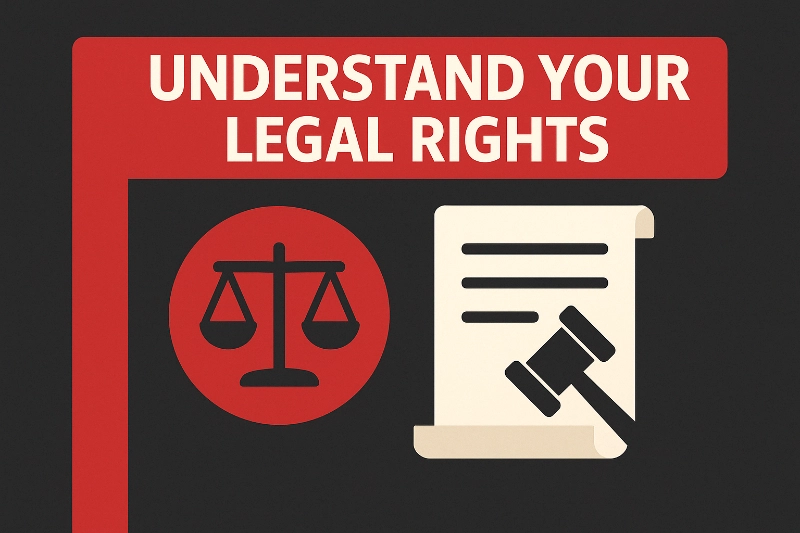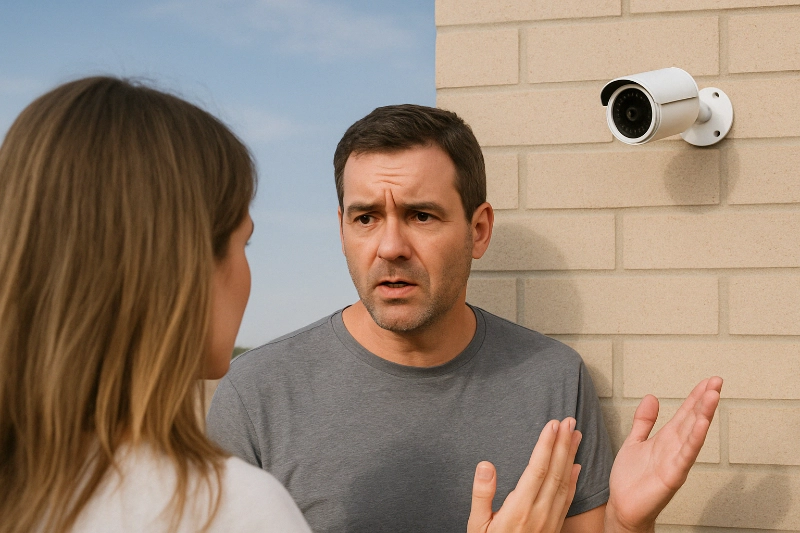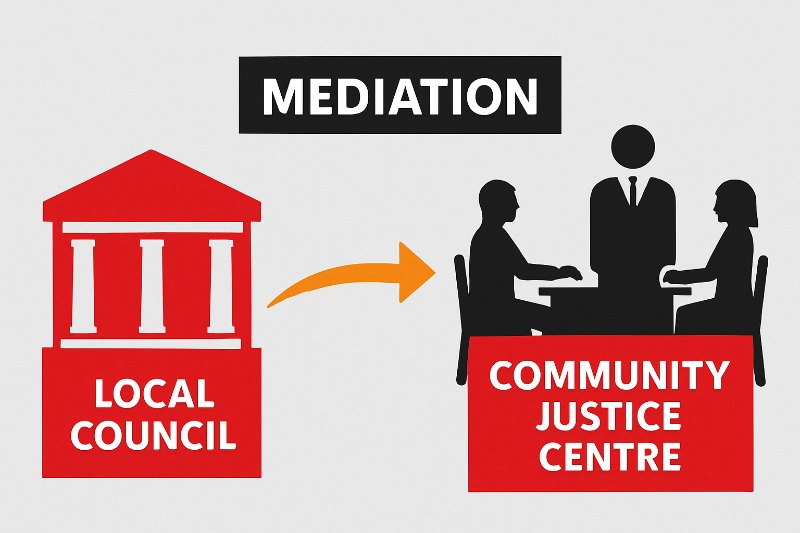If you’re concerned about your neighbour’s security camera directed at your property, this article will help you navigate the situation regarding home security camera laws . You’ll learn about your legal entitlements, how to start a courteous discussion, the option of employing mediation services when needed, and contemplating taking legal steps if all else fails.
Summary
- Understanding specific state and territory laws is crucial to navigating privacy concerns related to neighbour’s security cameras in Australia.
- Initiating a polite conversation with your neighbour and, if necessary, seeking mediation can often resolve disputes over security camera positioning and privacy issues.
- If mediation fails, legal actions may be pursued for privacy invasion, supported by documented evidence and consultations with legal professionals specialised in surveillance laws.

Understand Your Legal Rights
Understanding your legal rights is essential when dealing with issues related to a neighbour’s security camera. In Australia, the legality of installing security cameras is primarily determined by state and territory laws, as well as home security camera regulations.
For instance, in Western Australia, homeowners are typically allowed to install security cameras on their property without requiring prior approval. However, these cameras should primarily capture footage of their own property, such as driveways and backyards. It is illegal to install cameras that intentionally capture footage from neighbouring properties or public spaces. These rules are designed to prevent conflicts and protect privacy while allowing for adequate home surveillance.
In New South Wales, security camera installation is generally permissible unless the property owner objects, but recording audio requires the consent of all parties involved. Similarly, in Victoria, it is illegal to record audio without the permission of all involved parties.
If a security camera is directed at your property, it’s important to seek legal advice to understand your rights and potential actions you can take. Privacy laws are designed to balance security needs with individual privacy rights. Generally, private individuals have a right to privacy in their homes, but this right may be limited in public areas. If your neighbour’s camera is encroaching on your private space, being informed about your legal options is crucial.
Consulting a legal professional can help clarify any issues and prevent accidental breaches of privacy laws, ensuring you take the right steps to protect your privacy without escalating the situation unnecessarily. Castle Security have been installing cameras for over 30 years in WA so we know all the ins and outs of legislation as well.

Initial Steps to Address Privacy Concerns
Initiating a private dialogue with your neighbour is frequently the most straightforward approach to address privacy concerns related to their security camera. It’s advisable to calmly discuss how the position of their camera affects your sense of privacy. This direct conversation often leads to a resolution without needing escalation.
Encourage them thoughtfully to consider adjusting or repositioning the offending security camera so that it no longer captures images of your space. At times, neighbours might not be aware of just how much area their cameras cover and are willing to make amendments when this issue is brought forward. If you find yourself particularly troubled by its placement, feel free to express your desire for its removal.
Should personal discussion fail in achieving an agreement, turning toward local mediation services as a subsequent step can be beneficial. These services are designed to help resolve conflicts by arriving at solutions acceptable for all involved parties, which assists in avoiding potential legal complications while preserving positive relationships between neighbours.
Local Council and Community Justice Centre Mediation

In cases where direct discussions fall short, intervention by local councils and community justice centres can be pivotal in settling disagreements surrounding the installation of security cameras and CCTV systems. Some local authorities mandate that residents secure planning authorisation before setting up such surveillance equipment, especially when situated within communal or densely populated areas. These regulations serve to mitigate conflicts while ensuring adherence to municipal laws.
Community Justice Centres offer mediation services that are at no cost, discreet, and unbiased. Their objective is to facilitate consensus-building between conflicting parties via a mediator who assists in guiding conversations and brokering negotiations. Opting for this pathway may lead to quicker resolution with less hostility compared to traditional legal channels, proving advantageous in reconciling camera related disputes through neighbourhood mediation initiatives and championing grassroots judicial fairness.
When considering how best to approach contentions linked with security cameras, utilising these mediating solutions could prove beneficial. Should issues remain unresolved after these efforts, reaching out either directly for counsel from your local council or obtaining legal advice becomes advisable as a next step—aiming both at preserving amicable neighbourly relations while also addressing any privacy worries that arise due to camera installations.
Click Here for the contact details for the local counsels in WA.
Legal Actions for Invasion of Privacy
Should mediation be unsuccessful in addressing the issue, pursuing legal action may become a necessity. In certain states, if your neighbour has positioned their security camera to overlook your property, obtaining your permission might be obligatory. Agencies responsible for overseeing privacy and surveillance legislation can handle grievances related to these matters. If video surveillance is misused or is found to deliberately invade someone’s privacy, you may have recourse under the law.
An attorney who specialises in surveillance laws can offer insight into what rights you possess and possible avenues for taking legal action against inappropriate use of cameras directed at your space. Compiling evidence such as recorded videos or documented instances of harassment could bolster any claim when seeking judicial remedies—this proves particularly vital if substantial distress arises from a neighbour’s security camera capturing footage within the bounds of your property.
While it’s not always outright unlawful for neighbours’ cameras to encroach upon one’s privacy, common-law actions like nuisance claims are sometimes an option depending on where they’re aimed—at places commonly considered private by most people (like bedrooms or bathrooms), this could qualify as an invasion of privacy. It becomes increasingly important to seek professional legal advice when informal resolutions prove inadequate because oversight involving video recording without consent is widely viewed as illegitimate.
Adjusting Your Own Property for Privacy
Altering your personal property can serve as a potent solution for alleviating privacy issues. Disagreements regarding the installation of surveillance cameras often stem from their positioning and the scope of their coverage, but these concerns can typically be mitigated by making thoughtful adjustments to ensure they respect individuals’ privacy. Applying window films is an effective strategy for shielding internal views from prying eyes, thereby bolstering homeowners’ privacy, which is particularly beneficial in areas with high population density.
Homeowners have the flexibility to select varying degrees of transparency when it comes to window films, allowing them to determine the extent to which visibility is obstructed while continuing to permit light penetration. By choosing an appropriate shade of window tint, one can strike a balance between reaping natural sunlight benefits and upholding seclusion preferences—a suitable compromise embraced by numerous homeowners.
Such enhancements are instrumental in safeguarding security and discretion across both public domains and private spaces without aggravating disputes among neighbours. Taking initiative towards fortifying your own seclusion not only circumvents unintentional invasions of privacy, but also contributes significantly toward fostering a harmonious residential setting.

Surveillance Laws and Regulations
In Australia, the legality of using security cameras in public and private spaces s governed by varying laws and regulations in different states and territories. These guidelines dictate how surveillance devices can be deployed, particularly in public areas where there is no reasonable expectation of privacy. If a camera serves the community’s interest by monitoring these spaces—even if it incidentally captures footage from adjacent private properties—it may be permissible. It’s crucial to grasp the nuances of security camera laws to ensure one adheres to them.
For instance, within Western Australia, improperly employing a security camera that intrudes on private moments without authorisation could lead to consequences such as monetary fines or even incarceration. Local authorities might have specific mandates necessitating permits for homeowners who are installing surveillance apparatus on their premises. Individual personal security gadgets operated privately may escape regulation under the Privacy Act.
While homeowners possess the authority to fortify their residences with cameras for protection purposes, they must consider other individuals’ right to privacy carefully. Familiarity with stringent local ordinances concerning privacy and surveillance helps ward off legal complications that could arise otherwise—an imperative step before setting up home surveillance equipment. Professional advice regarding relevant state-specific legislation governing domestic safety measures would also prove beneficial in navigating this complex terrain effectively.

Importance of Professional Installation
Having a professional install CCTV cameras systems can guarantee compliance with privacy laws and prevent inadvertent recording of neighbouring properties, thus minimising potential legal issues. Many individuals opt to bolster their safety by installing security cameras throughout their property.
Enlisting experts like castle security for the installation of your security system mitigates possible conflicts and assures adherence to legal standards, thereby avoiding breaking surveillance laws . Our team will ensure that the system operates effectively, secures recorded data properly, and upholds the privacy rights of those around you. Castle Security, a renowned provider in Western Australia, offers expert installation services to ensure your security system is both effective and legally compliant.
How to Handle Harassment or Significant Harm
Should you find yourself adversely affected by a neighbour’s security camera, pursuing legal recourse through claims of privacy invasion or nuisance could be possible. To bolster your case for any judicial measures, compile and maintain records such as video evidence or detailed narratives of the harassment experienced.
It is imperative to seek counsel from a legal expert in these instances to fully grasp your entitlements and determine an appropriate strategy moving forward. A lawyer knowledgeable about covert surveillance laws and regulations pertaining to workplace monitoring will be able to illuminate your legal standing, potential reasons for litigation, and offer specialised guidance.
Summary
It’s crucial to be aware of the specific laws related to surveillance cameras that are applicable in each state or territory within Australia. If you have concerns about a neighbour’s security camera, it is advisable to address them in a composed and courteous manner initially, even under strict legal conditions . Should this approach not yield a satisfactory outcome, you may consider seeking mediation through local community justice centres or even pursuing legal action if necessary. Understanding your rights and the relevant privacy and surveillance laws can help you navigate these situations effectively. Always aim to maintain good neighbourly relations while ensuring your privacy rights are respected.
For expert assistance in understanding surveillance laws or installing compliant security systems, contact Castle Security. Reach out to us for guidance and support in navigating these complex issues.
